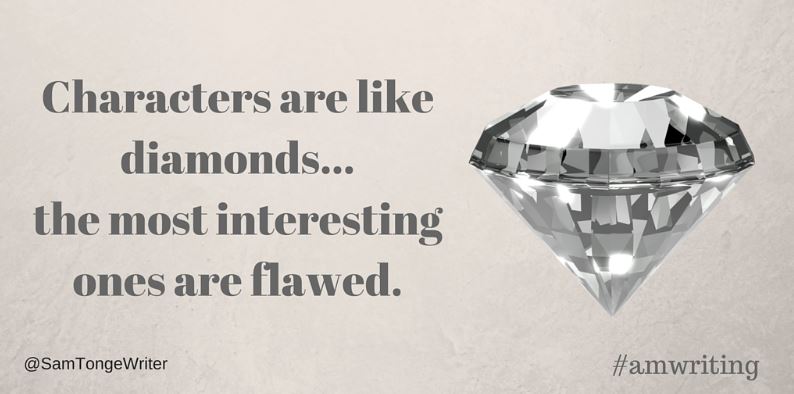With every book I write, I become increasingly interested in a character’s flaws. Is there any such thing as a true villain, for example? Like the archetypal school bully, there is usually a reason why people are who they are. In the bully’s case they often have low self-esteem and make themselves feel better by denigrating others. Perhaps they themselves were abused or bullied in some way, as a small child.
I don’t believe people are born evil. They are what they are due to what has happened to them along the journey of life, the starting point of which is being born as a bundle of innocence. Getting to know the backstory about people fascinates me – and if you want to fascinate your readers then make sure your characters are not perfect people who would never exist in the real world. 
Take books’ heroes, for example. Mr Darcy out of Jane Austen’s Pride and Prejudice. We all love him, don’t we, despite his stand-offish, arrogant ways? Because there is a sense of hidden vulnerability. That, combined with his imperious manner, makes for a killer combination because it makes us curious about our hero; makes us think that the haughtiness is perhaps all a front. This is much more appealing then if Mr Darcy had still been handsome, yes, but cheerful and charming to boot. Where’s the challenge?
You see, in my opinion, women and men – and smitten readers – want a challenge when getting to know their love-interest. This doesn’t mean the latter has to be an out and out scoundrel. They just need a few interesting layers. Take good-looking Dave out of my fun novella How to get Hitched in Ten Days (which is FREE at the moment). He is heart-broken at having blown a marriage proposal to girlfriend, Jazz, and has to enrol the help of her best friend Mikey, to win her back. But his attitude to gay Mikey borders on homophobic and makes us question our initial impression that Dave is a decent, lovable guy. It takes the course of the story to find out what is at the root of his supposed prejudice.
And in my new summer novel, out this week, Breakfast under a Cornish Sun, we get to meet unapproachable, grumpy Tremain. The lead character, Kate, sees glimpses of a sensitive guy in him, now and again, and this means – to her annoyance! – she can’t easily write him off as a person not worth knowing. The same with Lucas, the other man (and a Poldark lookalike!) she becomes friends with on her trip to Cornwall. Yes, he is gorgeous and swarthy and has the darkest, sexiest eyes – but would that alone really be enough to grab the attention of a woman looking for something meaningful?
There are all kinds of flaws in people – like in diamonds that can be cloudy, fractured or chipped – but this makes each one of them special and unique. Absolute clarity can be boring – there is no journey; nothing to discover than what is on the surface. And where is the empathy? If characters have imperfections they are more relatable and that makes us, as readers, more likely to care for them and read to the end. So if you want to keep your reader turning the pages, create an enigmatic hero or heroine with emotional and physical flaws, just like the scar on gorgeous Poldark’s face.

